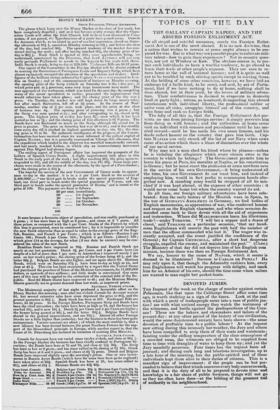TOPICS OF THE DAY
THE GALLANT CAPTAIN NAPIER, AND THE ABSURD FOREIGN ENLISTMENT ACT.
OF all stupid and suicidal measures, surely the • Foreign Enlist- tuent Act is one of the most absurd. It is no new doctrine, that a nation that wishes to remain at peace ought always to be pre- pared for war. But in what way are peaceful people to cultivate mili- tary talent—how to gain their experience ? Not in country quar- ters, nor yet at Windsor or Kew. The obvious course is, to per- mit such individuals as have a warlike tendency, to go abroad to learn their trade at other people's expense. They are sure to re- turn home at the call of national honour; and it is quite as well not to be troubled by such stirring spirits except in stirring times.. At the bidding of some other countries, however, we have laid an embargo (of a futile kind, to be sure), and said, by act of Parlia- ment, that if we have nothing to do at home, nothing shall be done abroad, but at their peril, by the lovers of military adven- ture. Their combativeness is doomed to evaporate in domestic broil or party fight ; unless, as is natural, disregarding this absurd interference with individual liberty, the professional soldier or sailor runs all risks, smuggles himself out of the country, and wins fame and rank on foreign fields. The folly of all this is, that the Foreign Enlistment Act pre- vents no one from joining foreign service: it simply prevents him from doing so with honour ; and the authorities at home never visit an individual with censure and punishment until he has me- rited reward—until he has made his own name famous, and his deeds reflect honour on the country that gave him birth. Cap- tain NAPIER was only struck off the list of our Navy when news came of an action which threw a blaze of distinction over the whole of our naval service.
Why may not a man shed his blood where he pleases—unless he is violating the allegiance which every citizen owes to the country to which he belongs? The Government permits him to leave his purse at Paris, his morality at Naples, or his constitution in Greece ; but he must exert the profession at arms nowhere save in the service of his own Government,—it being understood all the time, his own Government do not want him, and instead of employing him, would in fact prefer to commission hands alto- gether new. A standing army would be stripped of all its mis- chief if it was kept abroad, at the expense of other countries : it would never come home but when the country wanted its aid.
In all time, our foreign military adventurers have been cele- brated : from the early history of the Moorish wars in Spain, to the war of GUSTAVUS ADOLPHUS in Germany, we find bodies of English mercenaries, as apprentices of war, who conferred honour and respect on the English character, and who when occasion de- manded came back to their devoir with all the aid-of experience and instruction. Where did MARLBOROUGH learn his illustrious trade ?—under TURENNE. "'I will bet a supper and a dozen of claret,' said TURENNE on a particular occasion, 'that my hand- some Englishman will recover the post with half the number of men that the officer commanded who lost it: The wager was in- stantly accepted, and the event justified the confidence of the General ; for Captain CHURCHILL, after a short but desperate struggle, expelled the enemy, and maintained the post.— (Coxe.), The Ministry of that day did not deprive him of his English com mission, because there was then no Foreign Enlistment Act.
We say, honour to the name of NAPIER, which it seems is doomed to be illustrious! Success to CARLOS DE Forms! He may rely upon it, that though the Admiralty cashiers him, every true Englishman will watch his progress with delight, and mark him for an Admiral of his own, should the time come when sailors are wanted to man ought but packet-boats.




















 Previous page
Previous page